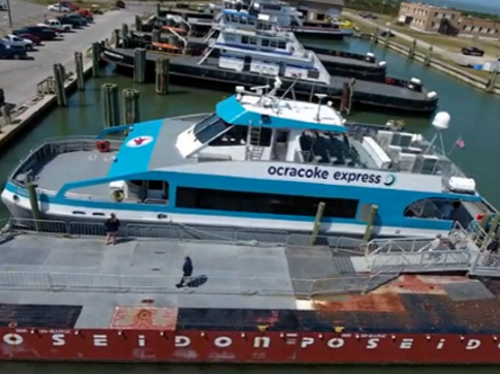The Federal Transit Administration is making nearly $300 million available through three competitive grant programs to boost access to rural ferry services, bolster existing and new urban services, and lower emissions across all services by speeding the adoption of zero-emission ferry propulsion technologies.
[Above photo by NCDOT]
The agency noted in a statement that grants are available for those three programs via a single, combined notice of funding opportunity, with the overall funding level coming by way of the $1.2 trillion Infrastructure Investment and Jobs Act or IIJA, enacted in November 2021.
Those programs include:
- Ferry Service for Rural Communities Program is a new grant program that seeks to ensure states provide basic essential ferry services to rural areas. For fiscal year 2022, $209 million is available.
- Electric or Low-Emitting Ferry Pilot Program is a new program that provides grants for electric or low-emitting ferries and associated infrastructure that reduce greenhouse gas emissions by using alternative fuels or onboard energy storage systems. For FY 2022, $49 million is available.
- Passenger Ferry Grant Program is an established program for funding capital projects that support existing passenger ferry services, establish new ferry services, and repair and modernize ferries, terminals, and related facilities and equipment in urbanized areas. For FY 2022, $36.5 million is available; of that, $3.25 million is set aside to support low or zero-emission ferries.
Many state departments of transportation that operate ferry services are witnessing a strong rebound in passenger demand.
For example, the North Carolina Department of Transportation recently noted that its four-year-old Ocracoke Express passenger ferry nearly matched pre-pandemic ridership levels over the first two months of its 2022 season despite using a smaller vessel.
The new Ocracoke Express ferry vessel carries 129 people versus the 149-person capacity previous model used from 2019 through 2021, noted NCDOT in a statement.
Meanwhile, the Alaska Department of Transportation & Public Facilities and the Southeast Conference announced plans to collaborate on a low-emission ferry project in May.
Alternative fuel-powered, low-emission and electric ferries could be a game-changer for Alaska’s Marine Highway System, the agency said, as it starts replacing aging ferry vessels in upcoming years.

